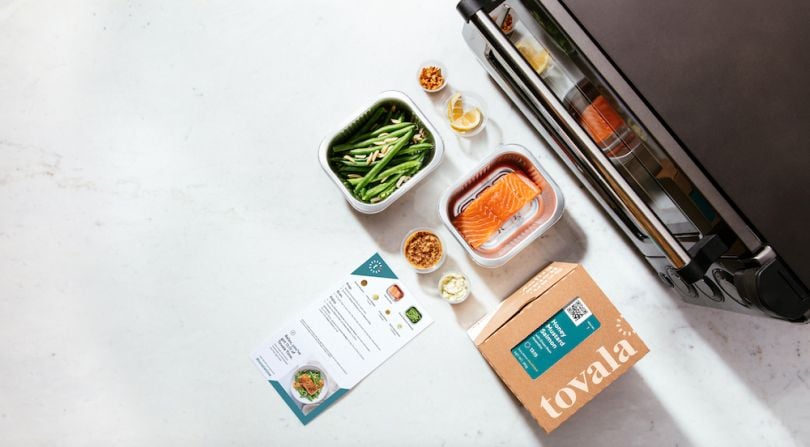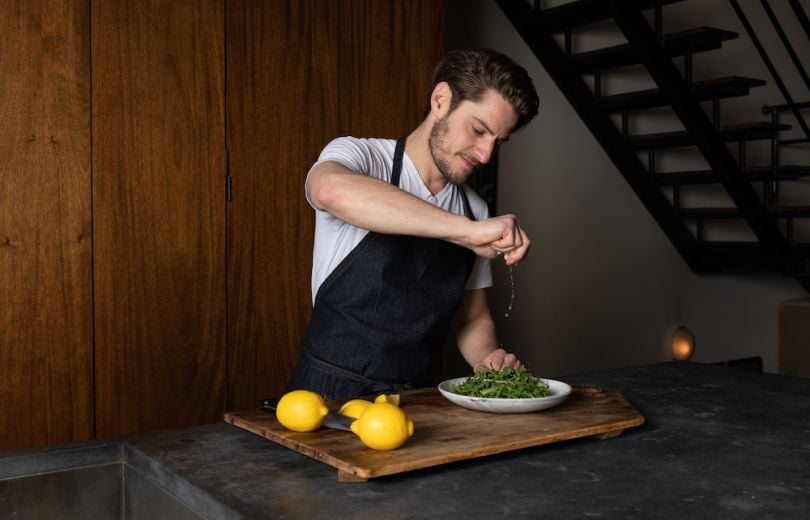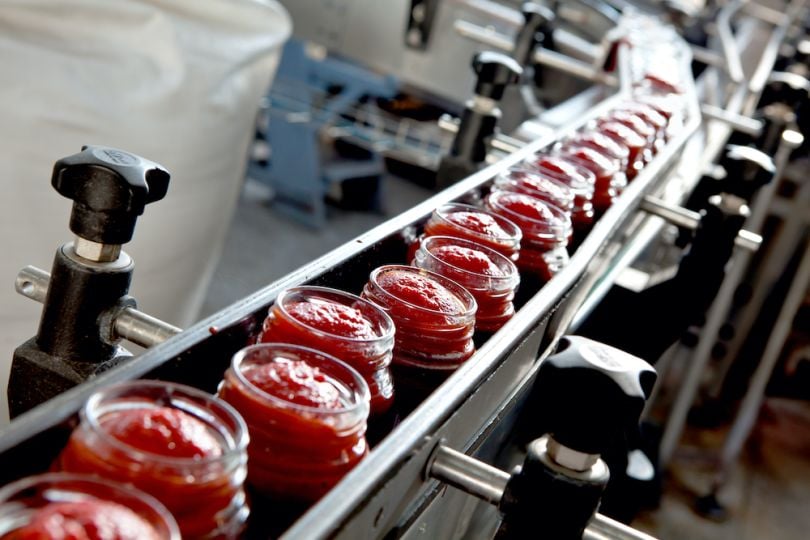Meal kit delivery is having a moment again, thanks to the pandemic accelerating dining-at-home trends.
Services that ship boxes of pre-portioned ingredients for home-cooked meals have fallen on hard times in recent years. But they experienced a recent uptick in business; the pandemic has kept many people out of restaurants and supermarkets — and inspired them to spend more time in the kitchen.
For many of these services, the sudden reversal has turned a battle for customer acquisition into a scramble to fulfill orders and coordinate a surge of deliveries.
And one of them is spinning more plates than the rest: Tovala. The Chicago-based startup is not only a meal delivery service, it’s a hardware company with a heavy software component too.

What is Tovala? If you’re a customer, you buy a connected countertop oven, which automatically downloads recipes to cook Tovala meals to exact specifications. You subscribe to its meal plan and choose from its rotating online menu (maple bourbon BBQ meatballs and apple-crusted pork chop, among other fare, are currently on offer). Meals are portioned, packaged and shipped to your door. Then, you use the oven to scan the QR code on the meal’s packaging, pop it in and press start. In less than 20 minutes, your food is ready to eat.
The company was founded (as Maestro Food Co.) in 2015 by David Rabie, who was tired of how long it took to cook a healthy homemade meal. Others agreed: Tovala raised $250,000 in a Kickstarter campaign and, since then, an additional $70 million, including $30 million in a Series C round in February 2021.
Pairing Engineers and Chefs
Tovala has two facilities, one for cooking and prep, another for packaging and shipping. (Its oven is manufactured in China.)
Getting the product right requires a wider-than-usual range of expertise. The company needs to create restaurant-quality meals that can be produced and shipped at scale and on time — and are compatible with an appliance that knows how to cook them just right.
Tovala pairs its engineers and manufacturing professionals with culinary team members who have fine-dining experience. They “work together in a unique way,” Keeley Kabala, senior vice president of hardware and operations, told Built In.
“It’s a lot of people working together in coordination, with a lot of planning.”
Kabala doesn’t come from a food background; he previously worked as an engineering manager at Whirlpool Corporation, where he started out designing dishwashers.
Team members like him combine their experience in large-scale production with the expertise of culinary team members who are mostly used to creating meals in smaller-scale settings.
“It’s a lot of people working together in coordination, with a lot of planning, that allows us to do that,” Kabala said. “I think that is what makes us somewhat unique. We have processes, but our food is not processed.”

Managing Inventory, Maintaining Quality
How does a small startup like Tovala meet sudden jumps in demand and get all the ingredients it needs to fulfill meal requirements?
It starts by planning meals out four to six weeks in advance and picking strategic menu items to fit its equipment, capacity and supply chain.
If cauliflower floret is on the menu that week, the team will look for ways to incorporate cauliflower into other meals (a side dish of cauliflower rice, in this case). That way, every part of the cauliflower gets used, and in as many ways as possible. It’s efficient and cost-effective. And Tovala is careful not to overdo it with one ingredient.
“It’s a multivariable problem that we’re trying to solve,” Kabala said. “Because at the same time, we’re trying to provide variety and newness to our customers.”
“It’s a multivariable problem that we’re trying to solve.”
Tovala also enjoys the added flexibility of a menu that changes weekly. It allows the team to react to ingredient shortages, and tweak its menu with little leeway. Like last year, when Tovala’s Italian tomato sauce supply suddenly vanished, due to the pandemic.
In instances like this, the culinary team has to rework the menu, and the procurement team has to make phone calls. It can be especially challenging to find substitute ingredients, since Tovala likes to use ones that are in season and can be incorporated into meals without preservatives or additives.
“Sometimes we find the easy options,” Kabala said, “and other times, we’re making stuff from scratch ourselves to fill in that one week.”
Before 2020, this wasn’t much of a concern for Tovala. But now, they have second and third options for almost every key ingredient.

Adapting to Pandemic Woes
A shortage of tomato sauce wasn’t the only complication that the pandemic added to Tovala’s operations. To meet the growing demand, team members would still need to meet physically in shared locations, in some proximity to each other, to get the job done; meals can’t be prepared and packaged remotely.
Managing this has “taken mindshare and a little bit of focus that we weren’t expecting,” Taryn Aronson, the chief operating officer, told Built In.
Tovala was able to adapt quickly, though. Its partners in China had been affected by the pandemic first, so the team had time to learn from them, and prepare for the additional safety measures that would need to be put in place.
The company added a third shift to work multiple days a week, a move that limited the number of overlapping team members. It also brought in an epidemiologist to consult. And ramped up sanitation too.
Tovala had also opened its second facility just as the pandemic lockdowns began. The additional space allowed people to spread out.
Packing Perfectly
The fresh food delivery space is crowded. Figuring out supply chain logistics, while not easy, is a well-paved path. The real challenge, according to Aronson, is doing delivery for partially cooked food, and in oven-safe containers.
“I had to work really closely with our engineering team to figure out how to make that whole system work,” she said.
There’s a lot of complexity around the packaging in particular. Meal kits are known for having a “packaging problem” and often use what feels like an excessive amount of cardboard, ice packs and insulation in each shipment. But some amount of this material is necessary, since companies are shipping perishable items.
Tovala spends a lot of time thinking about how to improve its shipment and insulation materials — to cut costs, increase shelf life and keep customers from “getting annoyed,” Kabala said.
“I think [we have] iterated the packaging now six times since I’ve been at Tovala,” he added. “We iterate the packaging almost a couple times a year.”
By Kabala’s estimation, Tovala tests out two or three different versions of insulations each month, working closely with several companies that specialize in shipping materials. “We’re always testing new insulations at our tech center,” he said. “We test pretty much everything we can find.”
“We test pretty much everything we can find.”
Due to the amount of competition in the food delivery industry, advancements in packaging technology are being made all the time. Companies are trying to get packaging lighter, smaller, easier to recycle and cheaper to make.
To drive packaging efficiency even further, Tovala relies on a computer model to adjust packaging based on where a shipment is headed (it ships to customers throughout the 48 continental United States). The model is designed to ensure food safety, but suggests how to include as little packaging material as possible. The model factors in each customer’s climate conditions: “A person living in Minnesota would probably get a different insulation and ice pack setup than the person living in South Florida,” Kabala said.

Tovala has seen a spike of new customers (and larger order sizes from existing customers) in recent months, and this growth spurt is said to have preceded the pandemic. With its latest round of funding, investors are betting the company can capture even more customers — and scale its operations to meet them.
Aronson, the COO, hinted at Tovala’s future: “There’s a lot of opportunity to add more complexity to our food offering,” she said, adding, “we want to ensure we’re maintaining quality as we scale.”




